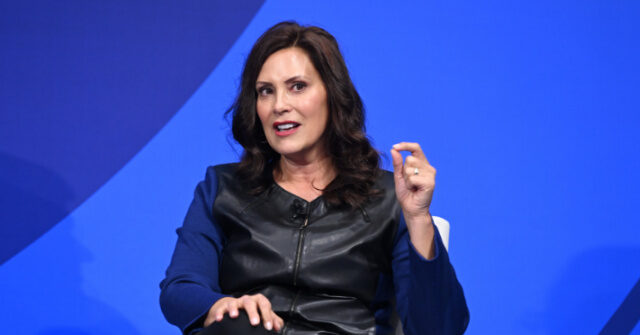In a recent episode that has sparked significant outrage, Gov. Gretchen Whitmer of Michigan has come under fire from the Michigan Catholic Bishops’ Conference for what they describe as a mockery of the sacrament of the Eucharist. In an Instagram video posted on Thursday, Whitmer can be seen positioning a Dorito chip on the open tongue of a kneeling woman, an act that closely imitates the Catholic ritual of Holy Communion, where believers receive the body of Christ. This act has been interpreted as offensive and blasphemous by Bishop Paul A. Long, the president of the Michigan Catholic Conference, who voiced the bishops’ concerns regarding the insensitivity shown towards a sacred practice for many Catholics.
The video intensified the already heightened sensitivities surrounding public figures and their treatment of religious practices. Long emphasized the importance of respect for all faiths in the state, which embodies a diverse religious landscape. He voiced that the act was not simply strange, but a glaring example of an elected official belittling the beliefs of religious individuals. The implications of such actions extend beyond personal offense; they reflect a broader trend in societal attitudes toward faith, which he argues is diminishing. Long called for public leaders to demonstrate a recommitment to civility and respect for those who derive meaning and fulfillment from their spiritual practices.
In the aftermath of the video’s release, Bill Donohue, the president of the Catholic League, issued a stark critique of Whitmer’s actions, declaring that she insulted Catholics not just in Michigan but nationwide. He pointed out that the nature of her act went beyond harmless fun and was a clear reflection of anti-Catholic sentiment. Donohue dismissed claims from Whitmer’s team suggesting that her actions were a mere imitation of a popular social media trend involving friends feeding each other. He argued that such comparisons are misleading; the typical TikTok trend does not involve kneeling or receiving food on the tongue, which is central to the sacramental act of Communion.
Diving deeper into the implications of Whitmer’s actions, Donohue stressed that there is little room for interpretation: the stunt is a direct derision of a vital component of Catholic faith. He insisted that the mocking perspective of the Eucharist should not be taken lightly, as it disregards the beliefs of millions who view this sacrament with the utmost reverence. The backlash highlights a discomfort among religious communities when public figures trivialize their sacred practices, which serve as a cornerstone of their spiritual identity.
The incident brings to light the broader societal challenges in navigating the intersection of faith and politics. Public officials, particularly in culturally diverse regions like Michigan, are urged to approach religious matters with greater sensitivity. The ongoing dialogue around respect and civility among varying faiths underscores a critical need for politicians to foster a more inclusive environment that honors all beliefs, not just those of the majority. The outcry from religious leaders and communities may serve as a wake-up call for politicians to reconsider their public personas and statements, particularly in the context of an increasingly polarized political landscape.
In conclusion, the reaction to Gov. Whitmer’s video illustrates a growing concern regarding the treatment of religious beliefs in public discourse. As faith communities grapple with perceptions of respect and acceptance in a diverse society, there is a pressing need for elected officials to reevaluate their actions and statements to ensure they foster understanding rather than perpetuate division. The Michigan Catholic Bishops’ Conference and the Catholic League’s responses underscore the importance of protecting the dignity of religious practices. Their calls for civility and respect reflect a broader desire for a political climate that honors the rich tapestry of beliefs held by constituents, paving the way toward greater harmony and understanding among all individuals, regardless of their faith.

